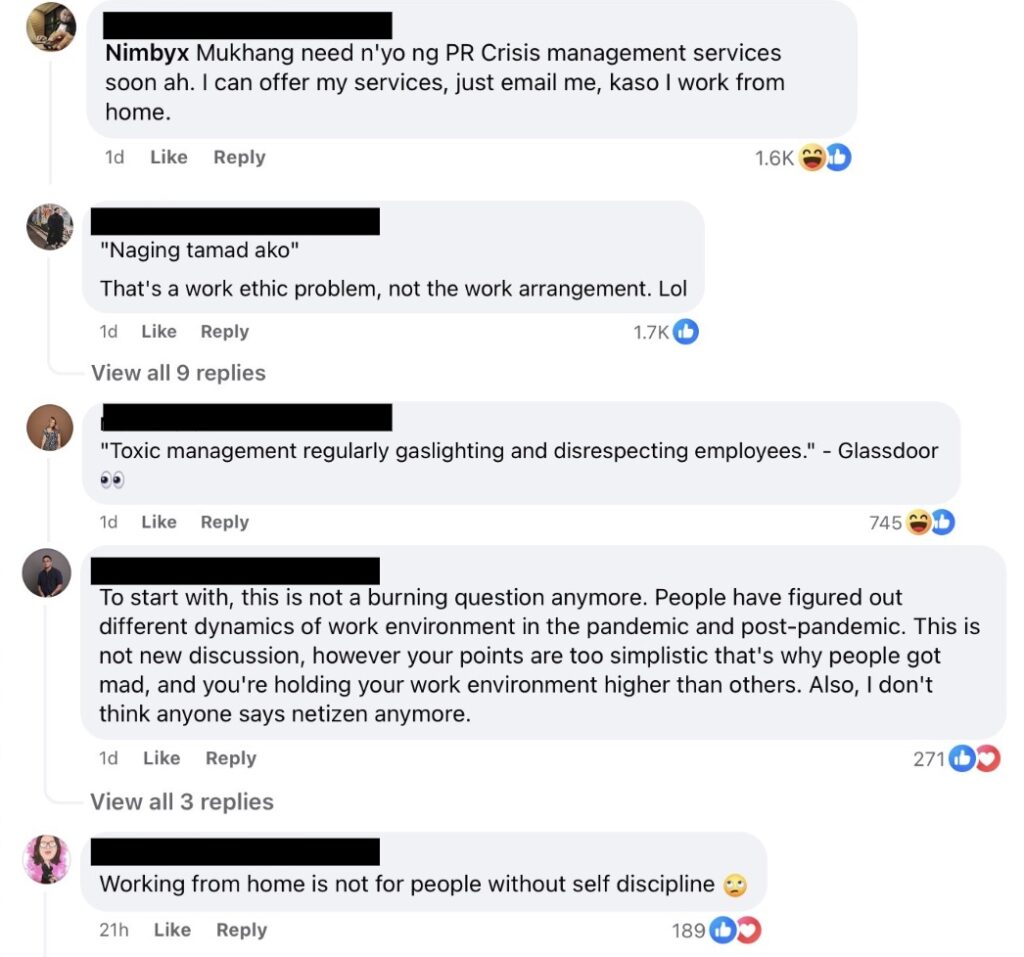After the pandemic, the industry shifted to online formats, affecting both education and employment. Today, remote work or working from home has become the new norm.
With no more rush hour, traffic, and the challenge of balancing work and personal life, working from home has made the job easier.
Additionally, a 2015 study by Cascio highlights that working from home boosts employee happiness by providing more family time, reducing stress from peak traffic, and offering greater flexibility. Cebuano Gen Zs also testify to this, saying that working from home changed their lives in terms of time management and handling pressure.
However, a TikTok video has recently gained popularity on social media, not for its entertainment value, but because it has offended many people working from home due to its content.
In the video, employees were asked to describe their thoughts on working from home in four words as a content. One said, “Encourages laziness and complacency,” another responded, “Boring and I’m alone,” while another mentioned, “I don’t like it.” The final comment came from the CEO, who said, “Makes you dumber every day.”
The video in question.
Avoid this company at all cost😭 https://t.co/QOYoYnlXF8 pic.twitter.com/MxTaSwPGDI
— Ralph C (@edens320) August 6, 2024
The TikTok video received a lot of criticism and sparked widespread conversation on social media.
One user expressed their dismay with the tweet, “So @nimbyx is belittling work-from-home employees now? This speaks volumes about the kind of work environment you have and the mindset you instill in your employees. DISGUSTING!”
Another user criticized the CEO’s choice of words, “Work from home is NOT for everyone, but don’t attack the WFH community as it’s a privilege and blessing to anyone esp that our transport system is fvcked up. AND WOW WHAT A CHOICE OF WORDS COMING FROM A CEO???”
A Reddit user also shared their thoughts on the CEO’s comment, “For me, I understand that not everyone thrives in a WFH setting. But hearing this kind of opinion struck me. I’m the healthiest and have become more confident and innovative in my job since I started working from home.”
Others also explained that such comments were unnecessary and that working from home depends on the individual.
One user said in a tweet, “I’d understand if they didn’t like wfh like on my end, im a 100% workaholic so i need a reason to set a boundary between work and personal life so i always prefer report to office jobs… weird na need nilang i-downplay ang wfh setup to prove ang pagiging pointless nila. [I’d understand if they don’t like WFH, because I’m a total workaholic and need a clear separation between work and personal life. That’s why I prefer office jobs. But, it’s strange that they need to downplay WFH to make themselves feel important.]”
Following the controversial TikTok video, the company addressed the issue by releasing a video on their Facebook account, featuring their answers to questions raised on social media. However, the comment section continues to be flooded with criticism.
Ultimately, the effectiveness of WFH versus on-site work depends on individual preferences and work ethic. While some thrive in the flexibility of remote work, others find the structure of an on-site set up more conducive to productivity.
However, the notion that WFH workers are somehow intellectually inferior is unfounded and deserves to be dismissed outright.
Other POP! stories you might like:
‘Havey or Waley?’ Rate all the branded trendjacking posts related to Carlos Yulo’s Olympic victory
How human hair can help clean up oil spills in Bataan
Student nurse gets cancelled over controversial video that shows sensitive footage in hospital
The internet has a lot to say about Carlos Yulo’s family controversy that is overshadowing his win
‘Clout farm?’: The Bianca Tan post looks increasingly suspicious as you look closer at the details


